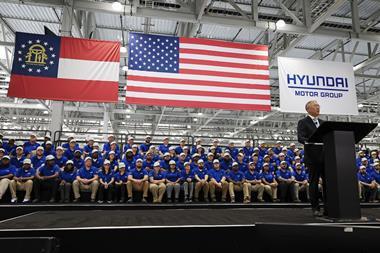
An increase in export demand for vehicles made at Kia’s plant in Gwangju in southern region of South Korea means the company will have to increase movements to ports in the south or risk costing itself time and money by moving vehicles across land to the port of Pyeongtak in the north, which currently handles the majority of exports.
“This year we have more volume from the Gwangju plant so we are moving more to the Mokpo port,” said Kia spokesman Hyung-Ho Kim. “That’s a big change for us.”
Benefiting from a global consumer base that was suddenly more cost conscious, and from the various consumer-incentive schemes that were put in place to facilitate the purchase of smaller vehicles, the Korean producer sold over 1m vehicles in 2009, a year-on-year increase of 20% compared to a decline of 3% across the global industry.
Kia also saw a boom in interest from developing markets such as China, where new car sales in 2009 grew by 70%, ahead of the overall market growth of 48%.
As a consequence Glovis, the logistics subsidiary it shares with Hyundai, has had to work quickly to transport more cars across the country for shipment to global markets, which by definition means increasing services from the ports as rail shipments are not an option through the Democratic People’s Republic of Korea to the north.
The means Glovis has also begun to invest more in deep-sea vessels recently, and take up a percentage of shipments that were previously handled exclusively by Eukor (read more here).
Kia’s flagship plant in Hwangsung, 90 minutes southwest of Kia’s headquarters in Seoul, is strategically close to its main port in Pyeongtak. It also has a plant close to Hwangsung in Seosan, a 50:50 joint venture with local Korean carmaker Donghee Auto, as well as a plant in Sohari, just north of Pyeongtak.
Recently, however, demand for the Soul SUV has increased by a dramatic 68% with Kia looking to export over 158,000 units of the model in 2010. And the Soul, along with other SUVs and commercial vehicles, is made at at Gwangju, nearer the Port of Mokpo.
This has led Glovis to look at increasing its feeder services to the port. “To overcome this kind of weak point we can invite more feeder services from harbour port to final destinations. If we invite this solution we can make no delay from the factory to the final customer,” said Richie Kim, general manager of Glovis’s business team.
Read more about Kia and Glovis in the forthcoming edition of Finished Vehicle Logistics.

























![Global[1]](https://d3n5uof8vony13.cloudfront.net/Pictures/web/a/d/s/global1_726550.svgz)










